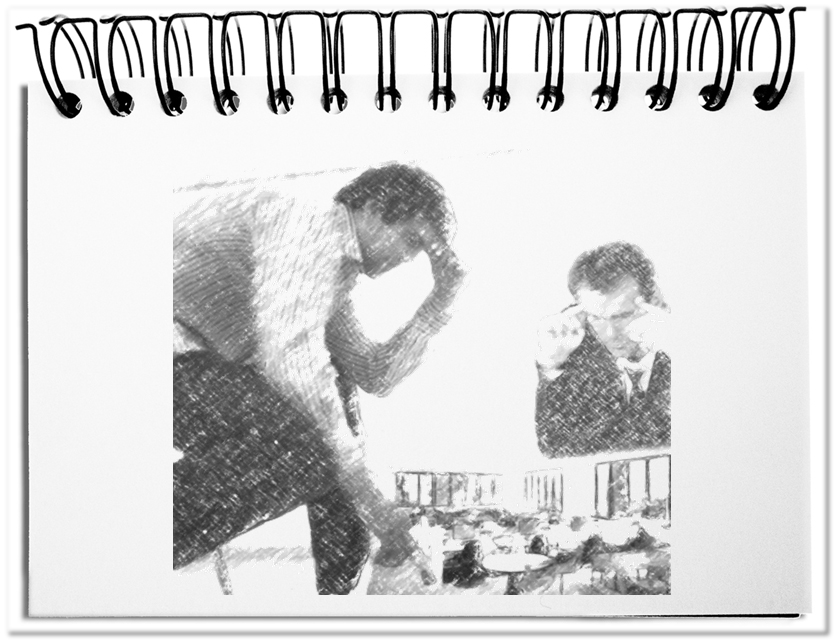The productivity of a society is not only determined by the turnover of the economic sector, but also by the degree of mutual private support, e.g. in the form of sharing. From time immemorial people create through joint efforts that could not be done solely. Building houses, clearing forests or digging wells required the cooperation of many individuals. Today associations realize new non-profit-models that build upon public spirit, e.g.
- Public bookcases
In cities you find bookcases that offer interested people the possibility of exchanging books in underground stations, modified telephone boxes or other public places. Some people leave them in these places and others take them – free of charge. http://en.wikipedia.org/wiki/Public_bookcase - Food bank
The rising number of non-profit support groups that collect fruits, vegetables and other food, which would be otherwise destroyed, help fellow citizens without means to make ends meet. http://en.wikipedia.org/wiki/Food_bank - Repair café
The new trend of self-help repair shops, where people help each other in repairing devices, avoid new purchases and extend substantially the “life” of electronic equipment. http://en.wikipedia.org/wiki/Repair_Caf%C3%A9
These trends contribute in a new way to the well-being of the society. However, at the same time social movements emerge that use these trends for their own purposes. But sharing only works, if everybody benefits in the long run.
Sharing is giving and taking that happens outside of the legal barriers of industries. Thus, it is an unregulated space that offers liberties that are not meant for commercial use. New ideas arise within the scope of governmental „public spirit” and the new ethics of sharing as well as by using the new possibilities of crowdsourcing. They offer a small group advantages by using the voluntary contributions of people that otherwise would have to be paid.
- Governmental „public spirit “
The public budgets are not able to fulfill all of their duties. Apart from public-private partnerships, governmental institutions transfer their tasks ever more frequently to the citizens. Today in Germany, volunteers assume tasks in estimated 70,000 to 100,000 self-help groups in the area of health, education and society, which actually the state would have to fulfill. This shift of responsibility takes place while maintaining the high social fees with less and less services. - New ethic of sharing
Established sectors have to grapple with rivals who invent new ideas based on the internet. Examples are the agencies for car sharing and other private driving services. They bring together travelers and transporters. These offers are not subject to official regulations of the carrying business (e.g. driver licenses, or vehicle standards or insurances). Or think about those agents, who offer in large cities of the world apartments without being part of the hotel trade and its regulations (e.g. hygiene, specific infrastructure, or obligation to register). Cheap prices create acceptance among customers, but endanger the traditional companies with unfair preferences. - Crowdsourcing
Everybody is in the Internet only a click away from each other. This makes it possible that everybody can provide a “small” contribution, as you can see in the following three examples. 1) The articles of the Wikipedia are produced and kept current free of charge by millions of authors. This eliminated the printed encyclopedias from the market. 2) In former times projects were financed by banks or sponsors. Today crowdfunding opens new financial resources. That way a music production can be financed via Pledge with small donations of the fans. 3) The approach the open innovation is particularly remarkable. In this concept, individuals take part in the search for information or the development of new products that will be later realized by the companies.
The respective enterprise saves internal capacities and cash flow for external specialists. The involved “idea provider” receive in the best case a small prize or other advantages. At the same time they waive the rights of the results that remain in the enterprise. These approaches reveal new resources on the back of volunteers and destroy valuable jobs.
These are not examples of sharing based on solidarity, since individual groups obtain commercial advantages from the public spirit of people.
As soon as politicians transfer duties to the public by releasing governmental institutions from their original roles, it is time to rethink the tax structure. Isn’t it critical that additional fees are introduced with sinking governmental services? Which are not called taxes, for understandable reasons, but toll, Soli, Riester, or covering of the pension provision gap?
Shouldn’t the conditions for commercial sharing be clearly specified? Why do entrepreneurs get the chance to make profits on the back of the general public, without having to follow the established rules of the respective industry? The volunteers and the established businesses should be better governed.
Eventually within the scope of open innovation, the authors of the ideas have to be protected in such a way that they get their share of the success of their ideas.
Bottom line: New ways of sharing utilize the volunteers and create advantages for the benefiting companies. These types of markets are not sustainable, since on the one hand governance will reach these businesses within a short time. On the other hand volunteers will not accept to bet exploited for a long time, because it is still valid: Sharing only works, if everybody benefits in the long run.


